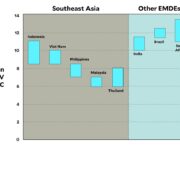Will there ever be a Lazada or Shopee for new cars?
As 2023 comes to a close, the Philippine car market has clearly bounced back from the seemingly hemorrhagic slump that it suffered following the COVID-19 pandemic in 2020.
The Chamber of Automotive Manufacturers of the Philippines Inc. (CAMPI), which is the country’s premier organization of car manufacturers, reported that sales of new motor vehicles hit 352,971 units from January to October 2023. This is 25.9 percent higher than the 280,300 units recorded in the same period last year.
CAMPI president Rommel Gutierrez said aggressive marketing activities, improved vehicle supply, better access to credit, and strong demand, all contributed to these impressive figures. He added that the car industry is confident that it will hit its target of 423,000 unit sales for the whole of 2023 – a number that was revised from the original 395,000 unit sales target.
This new figure is about 14 percent higher than the 372,083 units sold in 2022.
Despite the robust car market, there lies an interesting question – Why can’t we buy a brand-new car in the same way we purchase other items on Lazada or Shopee?
The perfect audienceThe Philippines certainly has the right conditions for an online new car-buying platform.
An August 2023 report by German data-gathering firm Statista found that around three in four Filipinos had Internet access, which includes the highly lucrative mobile data sector.
The company also found in a separate report, that Filipinos spent an average of 3 hours and 38 minutes online, which is the highest in the Asia-Pacific region. It added that some 84 million Filipinos were on social media, with Facebook lording it over the others with a 90-percent market share.
Statista projects that over 95 million Filipinos will be on social media by 2029, accounting for a staggering 80 percent of forecast population of 119 million for that year. The moniker “social media capital of the world” is certainly no hyperbole.
Why do you think there are seemingly endless sale promos for us on Shopee and Lazada?
Perks of going digital
As such, Statista noted that strategies like influencer marketing and social commerce “are increasingly becoming important among local and international brands hoping to connect to the millions of Filipino online users.”
Aside from the huge captive audience, there are many other reasons that businesses, large and small, invest in digital.
But the biggest consideration is cost – a year-long online campaign that includes ads and videos on Facebook, Instagram and TikTok costs considerably less than putting up billboards or getting 15-second commercial spots on prime time T.V.
As such, many car companies are pushing hard on digital platforms and online marketing. That’s why we “traditional” journalists have made new friends among the influencers who are invited to car launches and media drives (shoutout to Reph Bangsil, Macoy Dubs, Real Ryan, Ikigai and many others).
Another example is Toyota Motor Philippines, the country’s leading automaker, which is well-known for its bevy of influencers at major events like its Toyota GAZOO Racing Vios Cup.
In fact, many of these online stars don’t just cover or create content about these motorsports extravaganza, but also compete in the Vios Autocross Challenge to become the season champions.
Decades onlineAnd it’s not like buying a car online is an entirely new concept.
The used-car market worldwide has capitalized on selling their inventory online for decades. You can browse through a multitude of ads that include various details about a pre-loved automobile.
And in countries like the UK and the United States, used-car selling platforms are required to indicate things like accident history, insurance claims and other issues to comply with government regulations on transparency.
Locally, the likes of Carousell (formerly OLX), Automart.PH and Carsome Philippines have made their way to the top for their easy-to-use, used-car websites. Meanwhile, a variety of independent used-car dealers like Dashcarr Pro have capitalized heavily on their strong social-media following to generate sales.
The Digicars disaster
So, the Philippines has the audience and the tools to make buying a brand-new car online not just possible, but also highly successful.
But there are some reasons people would shy away from buying a car in the same manner that they would buy clothes or gadgets online.
For one, a brand-new car is the second most expensive item that most Filipinos would ever buy. As such, they want to make sure that they are giving their money to a legitimate entity with real people and a brick-and-mortar establishment that they can go back to.
Indeed, many car buyers are still reeling from the aftermath of the Digicars Auto Trading fiasco. This company enticed customers by offering monthly installments that were lower than those from other financing companies.
Under the scheme, customers got car loans from banks or in-house financing, such that the loan and other obligations were still under their name. But when customers coughed up the cash to Digicars, which would take charge of the “discounted” payments, many of them got their vehicles repossessed for missed payments.
The Securities and Exchange Commission revoked the firm’s registration on June 2023 for conducting financing activities, even though it was not allowed to under its certificate of incorporation.
Then on October 2023, the National Bureau of Investigation filed charges of syndicated estafa against Digicars CEO Reynaldo Calda and 49 other company employees for allegedly defrauding over 100 individuals nationwide.
Earning trust onlineThere is certainly no question that should the country’s major automakers decide to go full speed ahead with selling their cars online, they will not end up leaving their customers on the side of the road (literally and figuratively).
But the car industry and the government need to work harder to make car buyers trust online platforms through stronger regulatory protections and greater assurances of a legitimate and transparent transaction.
What car company wouldn’t want a low-cost and highly efficient way of selling their newest models to people with just the tap of a smartphone? And what sane car buyer would refuse a way to purchase a new vehicle without the stress of dealing with sometimes rapacious car dealerships?
And given the aforementioned figures on the growth of social media usage in the Philippines over the next six years, this incredible potential is something that no industry, automotive or otherwise, can ignore.
Could 2024 be the year to kick things off with a Lazada or Shopee for cars?















